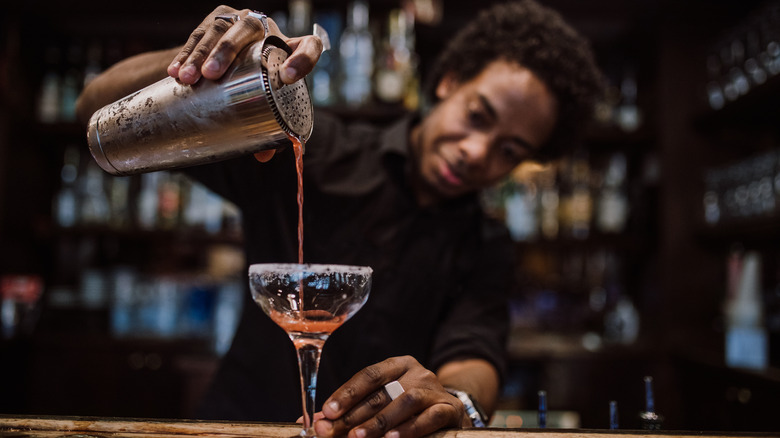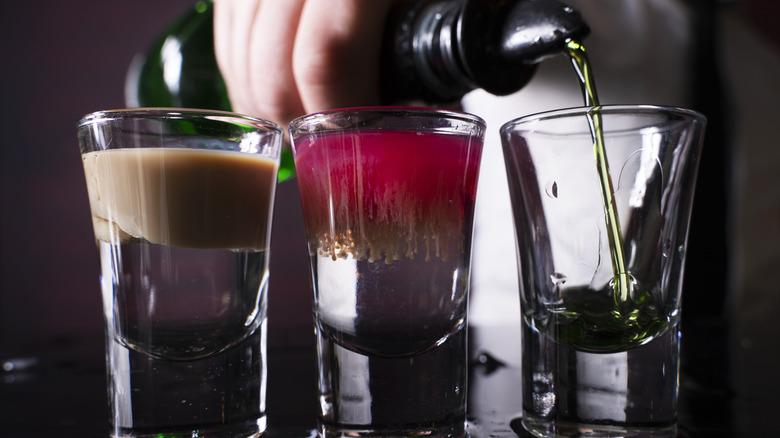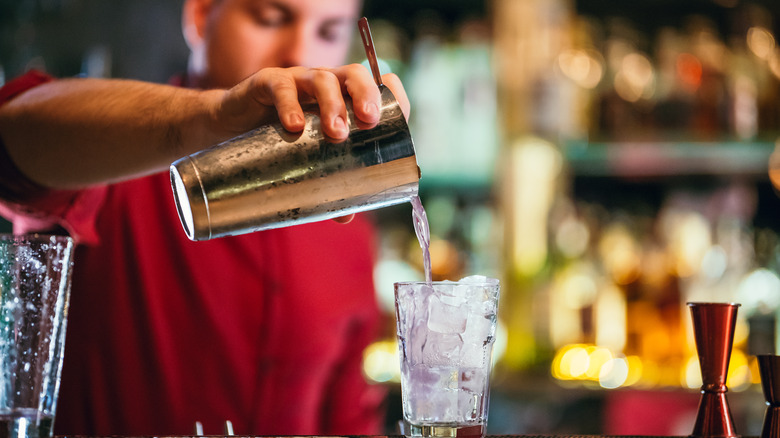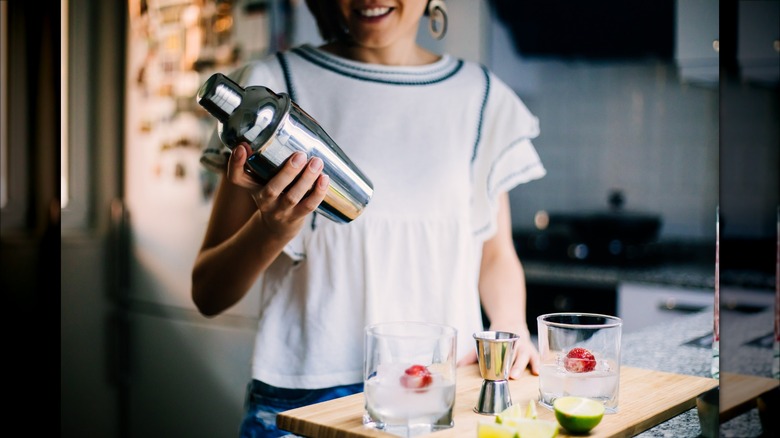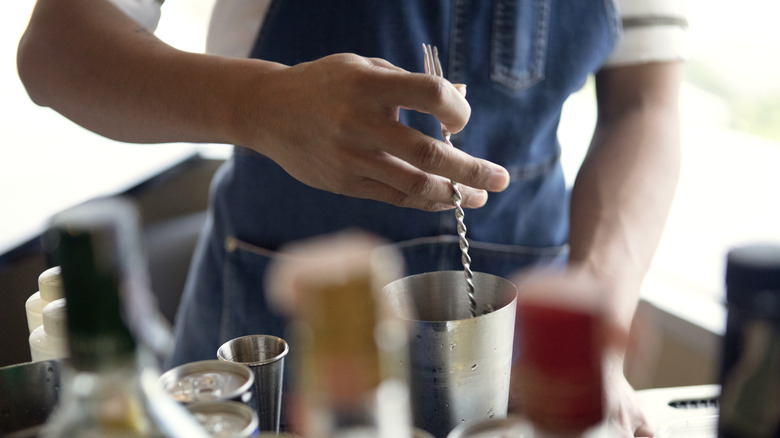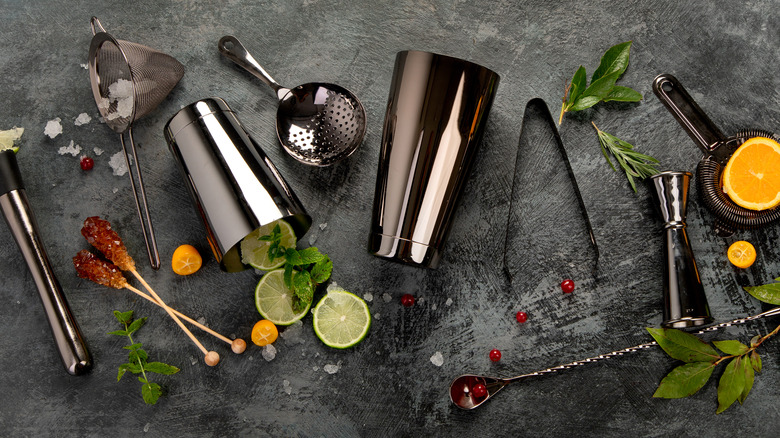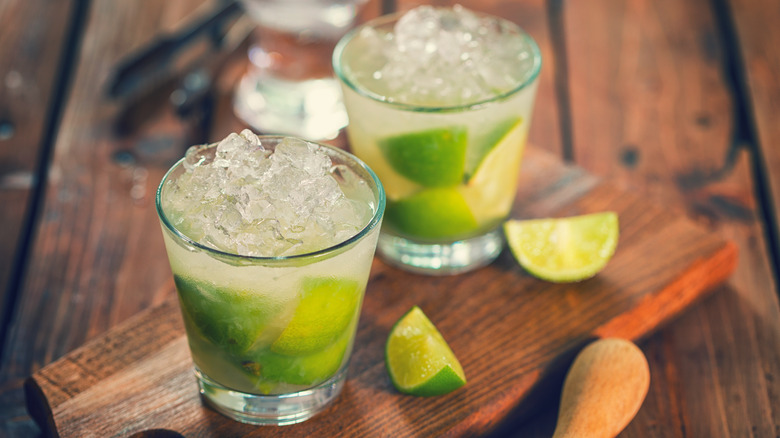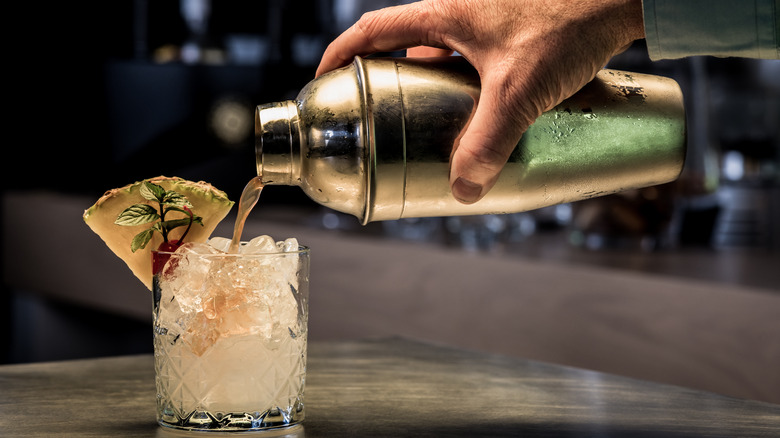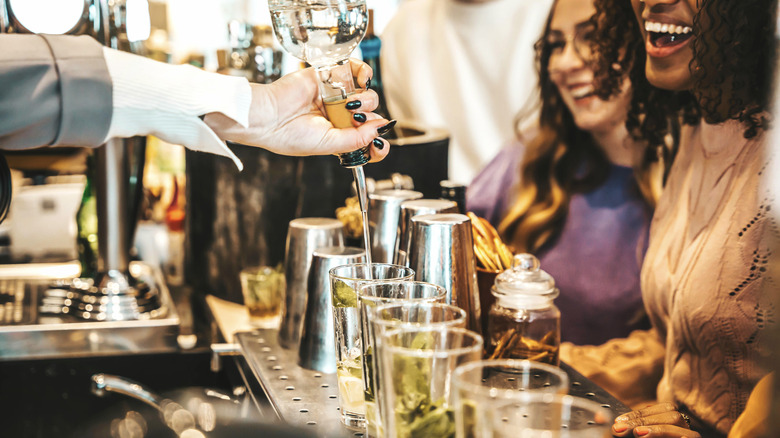8 Mistakes Everyone Makes When Mixing Cocktails
We may receive a commission on purchases made from links.
Whether you have a home bar and regularly mix up cocktails for friends and family or only occasionally make something for yourself to enjoy, you want your creations to shine. From the first sip to the last taste, everything needs to be perfect — the ingredients and flavor profiles, the ratios, and yes, even the glass that you're serving the cocktail in.
If you want to hone your skills as a home bartender, then it is essential to avoid some of the most common mistakes that people make when mixing cocktails. To help us understand more about these mistakes — and what you should do instead — we tapped two experts in the industry: Alberto Melendez, the General Manager and Beverage Director at Hutong in New York City, and Ryan Hook, the Bar Director at Ardor in West Hollywood, California. Read on to learn more about what these two cocktail connoisseurs advise against doing so you can make sure you're at the top of your game the next time you mix a drink.
1. Overpouring spirits
When you're mixing a cocktail, it is important to avoid adding too much rum, whiskey, tequila, or whichever tipple you've decided to engage for the evening. As Alberto Melendez shares, "Pouring too much alcohol can overpower the drink." If the cocktails you are mixing have too much alcohol compared to the other ingredients, you or the others you're serving aren't going to be able to taste all those other flavors. The profile just won't be right. If the drink is too strong, it could hit stronger than expected, potentially putting a damper on the evening as well.
The reason many people end up overpouring is because they pour without measuring. It is really difficult to know how much alcohol you're adding this way, and you can very easily end up adding too much (or possibly even not enough). Instead, Melendez says, "Use a jigger to measure precise amounts, following the recipe to maintain a balanced flavor profile."
2. Neglecting temperature control and ice quality
Temperature control and ice quality are two of the things that make a professionally-made cocktail from a fancy bar superior to what many people can make in their own homes. However, if you don't overlook these important elements of a mixed drink, there is no reason why the cocktails you craft can't rival those made by a professional. To start, it is essential to serve the beverages you mix at the appropriate temperature. Alberto Melendez shares some helpful advice to help you achieve this goal. He says, "Use chilled glasses for stirred drinks and serve shaken cocktails over fresh ice to maintain ideal temperatures."
However, you shouldn't use just any ice when preparing a shaken cocktail. Ice cubes that are too small will melt more quickly, diluting the drink and negatively impacting the texture. Melendez explains that you should "use large, clear ice cubes to slow dilution and enhance the visual appeal of the cocktail."
3. Not properly mixing each drink
Did you know that how you mix a cocktail is also important? After adding all the ingredients, you cannot simply swirl things around and assume the drink is going to taste as desired. Doing so can prevent the flavors from combining evenly, making some sips stronger, sweeter, or more bitter than others. Alberto Melendez says you must "Stir or shake thoroughly, ensuring all ingredients are well combined for a harmonious taste."
Other cocktails are meant to be shaken, not stirred. However, again, there is a right way and a wrong way to shake a drink. And, to make things even more complicated, the correct method can vary based on the ingredients and the way you'll be serving the drink. Ryan Hook says to use "a soft shake for a short amount of time for cocktails that need minimal dilution and are potentially going over crushed ice (because it will melt quickly); or perhaps you are adding soda water or other mixers after." Conversely, he notes that when making "martinis and other cocktails that will be served up," you'll need a much longer and harder shake with maximum force to ensure the best results.
4. Subbing or skipping ingredients
Both Alberto Melendez and Ryan Hook cited ingredient errors as a common mistake that people make when crafting a cocktail. Hook advises against substituting one alcohol for another simply because you already have it in your liquor cabinet. He explains, "I don't mean using Cocchi Torino vermouth instead of Carpano antica, since they are both sweet vermouth. I mean using something that seems similar like subbing Amaro Averno for Amaro Nonino. Or Using Aperol instead of Campari." Even though these are both considered amari it's they have very different flavor profiles. Hook suggests following the recipe exactly to get a sense of what flavors you're working with.
Melendez says it is a mistake to overlook the importance of using fresh ingredients, instead of more processed options, when mixing a cocktail. Specifically, he highlights how essential it is to add fresh herbs and fresh citrus fruits to your mixtures. He explains that adding fresher ingredients, instead of those from a can or bottle, will "add brightness and complexity to the drink."
5. Not using the appropriate tools and glassware
Having the right products on hand is essential for making and enjoying cocktails. First, you need the appropriate tools to help you properly combine and mix ingredients. Ryan Hook advises against purchasing cheaper shakers and other barware because they can be difficult to use and are more likely to leak. "If you are serious," Hook says, "you can buy proper tools from Cocktail Kingdom or BarFly (which are both also on Amazon) such as weighted shakers, jiggers, bar spoons, strainers, and mixing glasses.
Once you've invested in the best tools to prepare your cocktails, it would be a shame to serve them in the wrong glassware. Doing so could have a negative impact on the way the cocktail tastes or the overall experience of drinking it. Alberto Melendez shares that it is important to "match the glass to the cocktail type." He notes that "each shape enhances specific qualities of the drink."
6. Overlooking balance in flavor profiles
The right balance of different flavor profiles is key if you want to craft a balanced cocktail without any overpowering flavors. This is why, "disregarding the balance between sweet, sour, bitter, and savory elements," is one of the key cocktail-making mistakes that Alberto Melendez highlights. He explains that it is essential to "Pay attention to the cocktail's flavor profile," and shares that "adjusting ingredients [can] achieve a well-balanced taste."
To achieve this balanced taste that Melendez references, you must understand the different flavor combinations that make up a cocktail. These include a strong spirit, a weak dilution, tart acidity, and sweetness. While the base spirit may be seen as the key component of the beverage, without a weak dilution — such as juice, sparkling water, or even plain water — it is going to be too intense. Similarly, you must also strike the right balance between tart and sweet flavors. Citrus fruits are an example of a tart flavor, while syrups and sugars are two sweet flavors that can prevent the acidity from overpowering the drink. Or, use a fruit-infused simple syrup for an extra flavor punch. As a general rule, follow the golden ratio formula which is 2:1:1 – two parts liquor, one part sweet, one part sour.
7. Not being experimental enough
Ryan Hook stresses that as you start crafting cocktails, you first must "learn how flavors mix and why each cocktail element is important." Once you've achieved that goal, however, he suggests experimenting some. Hook says, "Throw some beet juice in your vodka or some passion fruit in your whiskey. See what happens!"
Beyond trying new flavors with a favorite spirit, try venturing out of your comfort zone a bit more and adding some spirits that you wouldn't normally try to a cocktail. Hook explains, "I love Bourbon, but generally don't drink Cognac. However, I think Cognac cocktails are amazing. Maybe you like vodka, so try a gin cocktail. Explore the different spirits that are out there. And yes, you won't like them all, but still try." You won't know what new and exciting discoveries are waiting for you unless you're willing to experiment a bit by trying something new.
8. Forgetting to sample drinks made by real bartenders
As you're exploring and experimenting with different cocktail recipes for yourself and your guests, make a point of visiting some of your favorite bars and other establishments periodically to sample some drinks made by a professional. Ryan Hook shares why he believes it is important to still try beverages made by professional bartenders. He says, "Remember there are people who dedicate their careers to learning how to make drinks. So make sure you go out and try their creations as well. Even ask them to make a bartender's choice drink for you."
Giving yourself a night off from making cocktails could be a welcome change. Instead of spending your time behind your home bar mixing drinks for friends and family, you'll find that you have more time to sit and enjoy the beverage that you are served. Plus, you never know, you could learn some tips and tricks from the bartender that will help you when you're stuck behind the bar at your next cocktail shindig.
